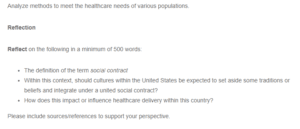Reflection – Social Contract in Healthcare
Defining Social Contract
Social contract refers to a theoretical agreement between individuals and the state or governing authority. It is a concept that explores the relationship between citizens and their government, where individuals consent to give up certain freedoms and abide by laws and regulations in exchange for protection and the benefits of living in a society. The social contract theory posits that the legitimacy of government and political authority is derived from the consent and agreement of the governed.
Expectations for Cultures in the United States
The question of whether cultures within the United States should set aside some traditions or beliefs and integrate under a united social contract is a complex and nuanced one. In a multicultural society like the United States, it is crucial to strike a balance between respecting cultural diversity and fostering social cohesion. While it is important to celebrate and preserve cultural traditions, there are certain values and principles that form the foundation of the social contract that all individuals within a society should adhere to. The United States is built upon the principles of equality, liberty, and justice for all. These principles are enshrined in the Constitution and serve as the basis for the social contract. While cultures within the United States should be respected and celebrated, it is reasonable to expect that certain traditions or beliefs that contradict these foundational principles may need to be reconsidered or modified (Febel et al., 2023). For example, practices that infringe upon individual rights, promote discrimination or undermine the rule of law would conflict with the united social contract and may require adjustment. We offer assignment help with high professionalism.
However, integration within a united social contract does not necessitate complete assimilation or erasure of cultural identities. It is possible to maintain cultural diversity while still upholding common values and principles. Integration should involve mutual understanding and respect between different cultures, fostering an environment where individuals can express their cultural identities while also adhering to shared societal norms. This requires open dialogue, education, and a commitment to inclusivity and equality.
Cultures within the United States should be encouraged to embrace a united social contract that upholds the fundamental principles of equality, liberty, and justice. Additionally, while certain traditions or beliefs that conflict with these principles may need to be reconsidered, it is essential to strike a balance that respects cultural diversity while promoting social cohesion. Integration should involve a respectful coexistence where individuals can maintain their cultural identities while adhering to the values and norms that bind society together.
The Impact of Social Contract on Healthcare Delivery in the United States
The influence of a united social contract on healthcare delivery in the United States can be significant. When diverse cultures integrate under a shared set of values and principles, it can foster a sense of solidarity and promote equitable healthcare access and delivery. A united social contract that prioritizes equality and justice can help address healthcare disparities that disproportionately affect marginalized communities (Bishara et al., 2023). It can drive policies and initiatives aimed at reducing barriers to healthcare access, improving cultural competence among healthcare providers, and ensuring that healthcare services are tailored to meet the diverse needs of the population. By embracing a united social contract, healthcare delivery in the country can become more inclusive, patient-centered, and focused on promoting the overall well-being of all individuals, regardless of their cultural background.
References
Bishara, D., Jurkovich, M., & Berman, C. (2023). Citizens’ understanding of the social contract: Lessons from Tunisia. World Development, 168, 106163. https://doi.org/10.1016/j.worlddev.2022.106163
Febel, G., Knopf, K., & Nonhoff, M. (2023). Contradiction Studies: Exploring the Field. An Introduction. 1–74. https://doi.org/10.1007/978-3-658-37784-7_1
ORDER A PLAGIARISM-FREE PAPER HERE
We’ll write everything from scratch
Question

Reflection – Social Contract in Healthcare
Analyze methods to meet the healthcare needs of various populations.
Reflection
Reflect on the following in a minimum of 500 words:
- The definition of the term social contract
- Within this context, should cultures within the United States be expected to set aside some traditions or beliefs and integrate under a united social contract?
- How does this impact or influence healthcare delivery within this country?
Please include sources/references to support your perspective.

